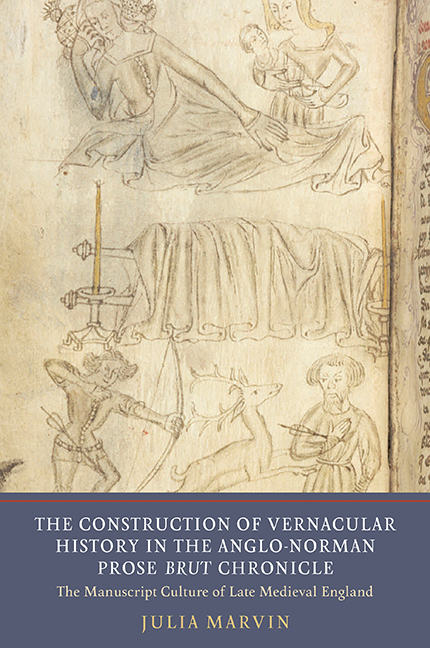 The Construction of Vernacular History in the Anglo-Norman Prose Brut Chronicle
The Construction of Vernacular History in the Anglo-Norman Prose Brut Chronicle Book contents
- Frontmatter
- Dedication
- Content
- List of Plates
- Acknowledgments
- Abbreviations
- A Note on Proper Names, Transcriptions, and Translations
- Introduction: Recognizing the Prose Brut Tradition
- Part I Construction
- Part II Reconstruction and Response
- Conclusion: Merlin's Power
- Bibliography
- General Index
- Index of Manuscripts Cited
Introduction: Recognizing the Prose Brut Tradition
Published online by Cambridge University Press: 01 February 2018
- Frontmatter
- Dedication
- Content
- List of Plates
- Acknowledgments
- Abbreviations
- A Note on Proper Names, Transcriptions, and Translations
- Introduction: Recognizing the Prose Brut Tradition
- Part I Construction
- Part II Reconstruction and Response
- Conclusion: Merlin's Power
- Bibliography
- General Index
- Index of Manuscripts Cited
Summary
It seems that sometime during the reign of Edward I, perhaps in the north of England, early enough that the king was still in his prime, but late enough that it was worth emphasizing his lordship over Scotland, a secular patron asked a cleric to compose a succinct history of Britain in French for a lay audience. The cleric was well suited to the task. He had access to a good library – one of institutional, probably monastic, quality. He was comfortable reading both Latin and French and was acquainted with some historical matter in English, whether in oral or written form. Whatever his position, he could write with understanding of and sympathy for the life of a secular household. Rendering verse and prose sources in a range of styles and languages into plain, accessible prose, he wrote more to communicate than to impress.
If the oldest surviving version of his work represents something close to what he wrote, he provided it with no title, no dedication to a patron, no selfidentification as author, no prologue describing how hard he worked, how many sources he used, and why his book was worth reading, and no request for a reward, position, or even the prayers of his audience in return for his effort. All that is known about him and the origins of the book comes from its content.
His reserve should not be taken as a sign of lack of interest in the job. If he had wanted just to fulfill a commission, he could have taken his three major sources, abridged them, and been on his way. Instead, as will become apparent, he did much more than that. Self-effacing and given to supererogatory effort, he was clearly not destined to get ahead in the world. But the book he wrote was an extraordinary success. It became the core of the most popular secular vernacular work of the late Middle Ages in England:the prose Brut chronicle.
In what is now known as the Oldest Version of the Anglo-Norman prose Brut, the chronicle offered its audiences unprecedented access to a complete history of the land, from the story of Britain's Trojan founder Brut to the death of Henry III in 1272.
- Type
- Chapter
- Information
- The Construction of Vernacular History in the Anglo-Norman Prose Brut ChronicleThe Manuscript Culture of Late Medieval England, pp. 1 - 18Publisher: Boydell & BrewerPrint publication year: 2017


